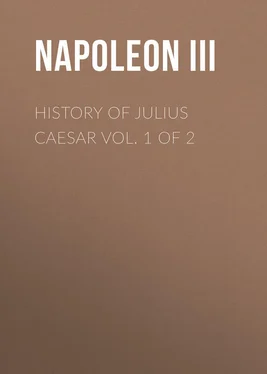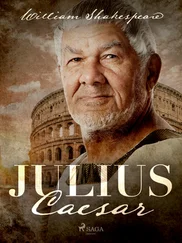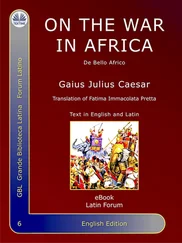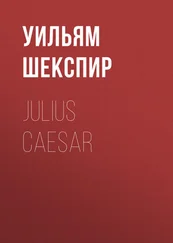Napoleon III - History of Julius Caesar Vol. 1 of 2
Здесь есть возможность читать онлайн «Napoleon III - History of Julius Caesar Vol. 1 of 2» — ознакомительный отрывок электронной книги совершенно бесплатно, а после прочтения отрывка купить полную версию. В некоторых случаях можно слушать аудио, скачать через торрент в формате fb2 и присутствует краткое содержание. Жанр: foreign_antique, foreign_prose, Биографии и Мемуары, на английском языке. Описание произведения, (предисловие) а так же отзывы посетителей доступны на портале библиотеки ЛибКат.
- Название:History of Julius Caesar Vol. 1 of 2
- Автор:
- Жанр:
- Год:неизвестен
- ISBN:нет данных
- Рейтинг книги:5 / 5. Голосов: 1
-
Избранное:Добавить в избранное
- Отзывы:
-
Ваша оценка:
- 100
- 1
- 2
- 3
- 4
- 5
History of Julius Caesar Vol. 1 of 2: краткое содержание, описание и аннотация
Предлагаем к чтению аннотацию, описание, краткое содержание или предисловие (зависит от того, что написал сам автор книги «History of Julius Caesar Vol. 1 of 2»). Если вы не нашли необходимую информацию о книге — напишите в комментариях, мы постараемся отыскать её.
History of Julius Caesar Vol. 1 of 2 — читать онлайн ознакомительный отрывок
Ниже представлен текст книги, разбитый по страницам. Система сохранения места последней прочитанной страницы, позволяет с удобством читать онлайн бесплатно книгу «History of Julius Caesar Vol. 1 of 2», без необходимости каждый раз заново искать на чём Вы остановились. Поставьте закладку, и сможете в любой момент перейти на страницу, на которой закончили чтение.
Интервал:
Закладка:
Liguria, Cisalpine Gaul, Venetia, and Illyria.
V. Alone in the Tyrrhene Sea, the Ligures had not yet risen out of that almost savage life which the Iberians, sprung from the same stock, had originally led. If some towns on the Ligurian coast, and especially Genoa ( Genua ), carried on a maritime commerce, they supported themselves by piracy 287rather than by regular traffic. 288
On the contrary, Cisalpine Gaul, properly so called, supported, as early as the time of Polybius, a numerous population. We may form some idea of it from the losses this province sustained during a period of twenty-seven years, from 554 to 582; Livy gives a total of 257,400 men killed, taken, or transported. 289The Gaulish tribes settled in the Cisalpine, though preserving their original manners, had, through their contact with the Etruscans, arrived at a certain degree of civilisation. The number of towns in this country was not very considerable, but it contained a great abundance of villages. 290Addicted to agriculture like the other Gauls, the Cisalpines bred in their forests droves of swine in such numbers, that they would have been sufficient, in the time of Strabo, to provision all Rome. 291The coins of pure gold, which in recent times have been found in Cisalpine Gaul, especially between the Po and the Adda, and which were struck by the Boii and some of the Ligurian populations, furnish evidence of the abundance of that metal, which was collected in the form of gold sand in the waters of the rivers. 292Moreover, certain towns of Etruscan origin, such as Mantua ( Mantua ) and Padua ( Patavium ), preserved vestiges of the prosperity they had reached at the time when the peoples of Tuscany extended their dominion beyond the Po. At once a maritime town and a place of commerce, Padua, at a remote epoch, possessed a vast territory, and could raise an army of 120,000 men. 293The transport of goods was facilitated by means of canals crossing Venetia, partly dug by the Etruscans. Such were those especially which united Ravenna with Altinum ( Altino ), which became at a later period the grand store-house of the Cisalpine territory. 294
The commercial relations entertained by Venetia with Germany, Illyria, and Rhætia, go back far beyond the Roman epoch, and, at a remote antiquity, it was Venetia which received the amber from the shores of the Baltic. 295All the traffic which was afterwards concentrated at Aquileia, founded by the Romans after the submission of the Veneti, had then for its centre the towns of Venetia; and the numerous colonies established by the Romans in this part of the peninsula are proofs of its immense resources. Moreover, the Veneti, occupied in cultivating their lands and breeding horses, had peaceful manners which facilitated commercial relations, and contrasted with the piratical habits of the populations spread over the north and north-eastern coasts of the Adriatic.
The Istrians, the Liburni, and the Illyrians were the nations most formidable, both by their corsairs and by their armies; their light and rapid barques covered the Adriatic, and troubled the navigation between Italy and Greece. In the year 524, the Illyrians sent to sea a hundred lembi , 296while their land army counted hardly more than 5,000 men. 297Illyria was poor, and offered few resources to the Romans, notwithstanding the fertility of its soil. Agriculture was neglected, even in the time of Strabo. Istria contained a population much more considerable, in proportion to its extent. 298Yet she had, no more than Dalmatia and the rest of Illyria, attained, at the epoch of which we are speaking, that high degree of prosperity which she acquired afterwards by the foundation of Tergeste ( Trieste ) and Pola. The Roman conquest delivered the Adriatic from the pirates who infested it, 299and then only, the ports of Dyrrhachium and Apollonia obtained a veritable importance.
Epirus.
VI. Epirus, a country of pastures and shepherds, intersected by picturesque mountains, was a sort of Helvetia. Ambracia (now Arta ), which Pyrrhus had chosen for his residence, had become a very fine town, and possessed two theatres. The palace of the king ( Pyrrheum ) formed a veritable museum for it furnished for the triumph of M. Fulvius Nobilior, in 565, two hundred and eighty-five statues in bronze, two hundred and thirty in marble, 300and paintings by Zeuxis, mentioned in Pliny. 301The town paid also, on this occasion, five hundred talents (2,900,000 francs, [£116,000]), and offered the consul a crown of gold weighing a hundred and fifty thousand talents (nearly 4,000 kilogrammes). 302It appears that before the war of Paulus Æmilius, this country contained a rather numerous population, and counted seventy towns, most of them situated in the country of the Molossi. 303. After the battle of Pydna, the Roman general made so considerable a booty, that, without reckoning the treasury’s share, each foot-soldier received 200 denarii (about 200 francs [£8]), and each horse-soldier 400; in addition to which the sale of slaves arose to the enormous number of 150,000.
Greece.
VII. At the beginning of the first Punic War, Greece proper was divided into four principal powers: Macedonia, Ætolia, Achaia, and Sparta. All the continental part, which extends northward of the Gulf of Corinth as far as the mountains of Pindus, was under the dependence of Philip; the western part belonged to the Ætolians. The Peloponnesus was shared between the Achæans, the tyrant of Sparta, and independent towns. Greece had been declining during about a century, and seen her warlike spirit weaken and her population diminish; and yet Plutarch, comprising under this name the peoples of the Hellenic race, pretends that their country furnished King Philip with the money, food, and provisions of his army. 304The Greek navy had almost disappeared. The Achæan league, which comprised Argolis, Corinth, Sicyon, and the maritime cities of Achæa, had few ships. On land the Hellenic forces were less insignificant. The Ætolian league possessed an army of 10,000 men, and, in the war against Philip, pretended to have contributed more than the Romans to the victory of Cynoscephalæ. Greece was still rich in objects of art of all descriptions. When, in 535, the King of Macedonia captured the town of Thermæ, in Ætolia, he found in it more than two thousand statues. 305
Athens, in spite of the loss of her maritime supremacy, preserved the remains of a civilization which had already attained the highest degree of splendour, 306and those incomparable buildings of the age of Pericles, the mere name of which reminds us of all that the arts have produced in greatest perfection. Among the most remarkable were the Acropolis, with its Parthenon and its Propylæa, masterpieces of Phidias, the statue of Minerva in gold and ivory, and another in bronze, the casque and spear of which were seen afar off at sea. 307The arsenal of the Piræus, built by the architect Philo, was, according to Plutarch, an admirable work. 308
Sparta, although greatly fallen, was distinguished by its monuments and by its manufactures; the famous portico of the Persians, 309built after the Median wars – the columns of which, in white marble, represented the illustrious persons among the vanquished – was the principal ornament of the market. Iron, obtained in abundance from Mount Taygetus, was marvellously worked at Sparta, which was celebrated for the manufacture of arms and agricultural instruments. 310The coasts of Laconia abounded in shells, from which was obtained the purple, most valued after that of Phœnicia. 311The port of Gytheum, very populous, and very active in 559, still possessed great arsenals. 312
In the centre of the peninsula, Arcadia, although its population was composed of shepherds, had the same love for the arts as the rest of Greece. It possessed two celebrated temples: that of Minerva at Tegæa, built by the architect Scopas, 313in which were united the three orders of architecture, and that of Apollo, at Phigalea, 314situated at an elevation of 3,000 feet above the level of the sea, and the remains of which still excite the wonder of travellers.
Читать дальшеИнтервал:
Закладка:
Похожие книги на «History of Julius Caesar Vol. 1 of 2»
Представляем Вашему вниманию похожие книги на «History of Julius Caesar Vol. 1 of 2» списком для выбора. Мы отобрали схожую по названию и смыслу литературу в надежде предоставить читателям больше вариантов отыскать новые, интересные, ещё непрочитанные произведения.
Обсуждение, отзывы о книге «History of Julius Caesar Vol. 1 of 2» и просто собственные мнения читателей. Оставьте ваши комментарии, напишите, что Вы думаете о произведении, его смысле или главных героях. Укажите что конкретно понравилось, а что нет, и почему Вы так считаете.












